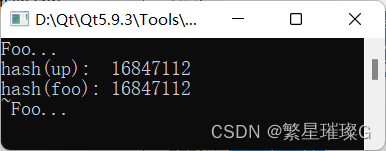定义于头文件 <memory>
template< class T, class Deleter = std::default_delete<T>>
class unique_ptr; (1) (C++11 起)
template < class T,class Deleter>
class unique_ptr<T[], Deleter>; (2) (C++11 起) 与另一个 unique_ptr 或 nullptr 进行比较
operator==,!=,<,<=,>,>=(std::unique_ptr)| template<class T1, class D1, class T2, class D2> | (1) | (C++11 起) |
| template<class T1, class D1, class T2, class D2> | (2) | (C++11 起) |
| template<class T1, class D1, class T2, class D2> | (3) | (C++11 起) |
| template<class T1, class D1, class T2, class D2> | (4) | (C++11 起) |
| template<class T1, class D1, class T2, class D2> | (5) | (C++11 起) |
| template<class T1, class D1, class T2, class D2> | (6) | (C++11 起) |
| template <class T, class D> | (7) | (C++11 起) |
| template <class T, class D> | (8) | (C++11 起) |
| template <class T, class D> | (9) | (C++11 起) |
| template <class T, class D> | (10) | (C++11 起) |
| template <class T, class D> | (11) | (C++11 起) |
| template <class T, class D> | (12) | (C++11 起) |
| template <class T, class D> | (13) | (C++11 起) |
| template <class T, class D> | (14) | (C++11 起) |
| template <class T, class D> | (15) | (C++11 起) |
| template <class T, class D> | (16) | (C++11 起) |
| template <class T, class D> | (17) | (C++11 起) |
| template <class T, class D> | (18) | (C++11 起) |
比较二个 unique_ptr 或 unique_ptr 与 nullptr 的指针值。
1-6) 比较二个 unique_ptr 。
7-18) 比较 unique_ptr 与 nullptr 。
参数
| x, y | - | 要比较的 unique_ptr |
返回值
1) x.get() == y.get()
2) x.get() != y.get()
3) std::less<CT>()(x.get(), y.get()) ,其中 CT 是 std::common_type<unique_ptr<T1, D1>::pointer, unique_ptr<T2, D2>::pointer>::type
4) !(y < x)
5) y < x
6) !(x < y)
7-8) !x
9-10) (bool)x
11) std::less<unique_ptr<T,D>::pointer>()(x.get(), nullptr)
12) std::less<unique_ptr<T,D>::pointer>()(nullptr, y.get())
13) !(nullptr < x)
14) !(y < nullptr)
15) nullptr < x
16) y < nullptr
17) !(x < nullptr)
18) !(nullptr < y)
调用示例
#include <iostream>
#include <memory>
int main()
{
std::unique_ptr<int> p1(new int(42));
std::unique_ptr<int> p2(new int(42));
std::cout << "p1 == p1: " << (p1 == p1) << '\n';
// p1 与 p2 指向不同内存位置,故 p1 != p2
std::cout << "p1 == p2: " << (p1 == p2) << '\n';
}输出

特化 std::swap 算法
std::swap(std::unique_ptr)template< class T, class Deleter >
void swap( unique_ptr<T,Deleter>& lhs,
unique_ptr<T,Deleter>& rhs ) noexcept;(C++11 起) 为 std::unique_ptr 特化 std::swap 算法。交换 lhs 与 rhs 的指针。调用 lhs.swap(rhs) 。
| 此重载仅若 std::is_swappable<D>::value 为 true 才参与重载决议。 | (C++17 起) |
参数
| lhs, rhs | - | 要交换内容的智能指针 |
返回值
(无)
复杂度
常数
std::unique_ptr 的散列支持
std::hash <std::unique_ptr>template<class T, class Deleter> struct hash<unique_ptr<T, Deleter>>;(C++11 起) std::hash 对 std::unique_ptr<T, Deleter> 的模板特化允许用户获得 std::unique_ptr<T, Deleter> 类型对象的哈希值。
| 若启用 std::hash<typename std::unique_ptr<T,D>::pointer> ,则启用特化 std::hash<std::unique_ptr<T,D>> (见 std::hash ),否则禁用它。 | (C++17 起) |
启用时, (C++17 起)对于给定的 std::unique_ptr<T, D> p ,此特化确保 std::hash<std::unique_ptr<T, D>>()(p) == std::hash<typename std::unique_ptr<T, D>::pointer>()(p.get()) 。
此特化的成员函数不保证为 noexcept ,因为指针可能是缀饰指针且其哈希可能抛出。
调用示例
#include <iostream>
#include <memory>
#include <functional>
struct Foo
{
Foo()
{
std::cout << "Foo...\n";
}
~Foo()
{
std::cout << "~Foo...\n\n";
}
};
int main()
{
Foo* foo = new Foo();
std::unique_ptr<Foo> up(foo);
std::cout << "hash(up): " << std::hash<std::unique_ptr<Foo>>()(up) << '\n';
std::cout << "hash(foo): " << std::hash<Foo*>()(foo) << '\n';
}输出























 1204
1204











 被折叠的 条评论
为什么被折叠?
被折叠的 条评论
为什么被折叠?








